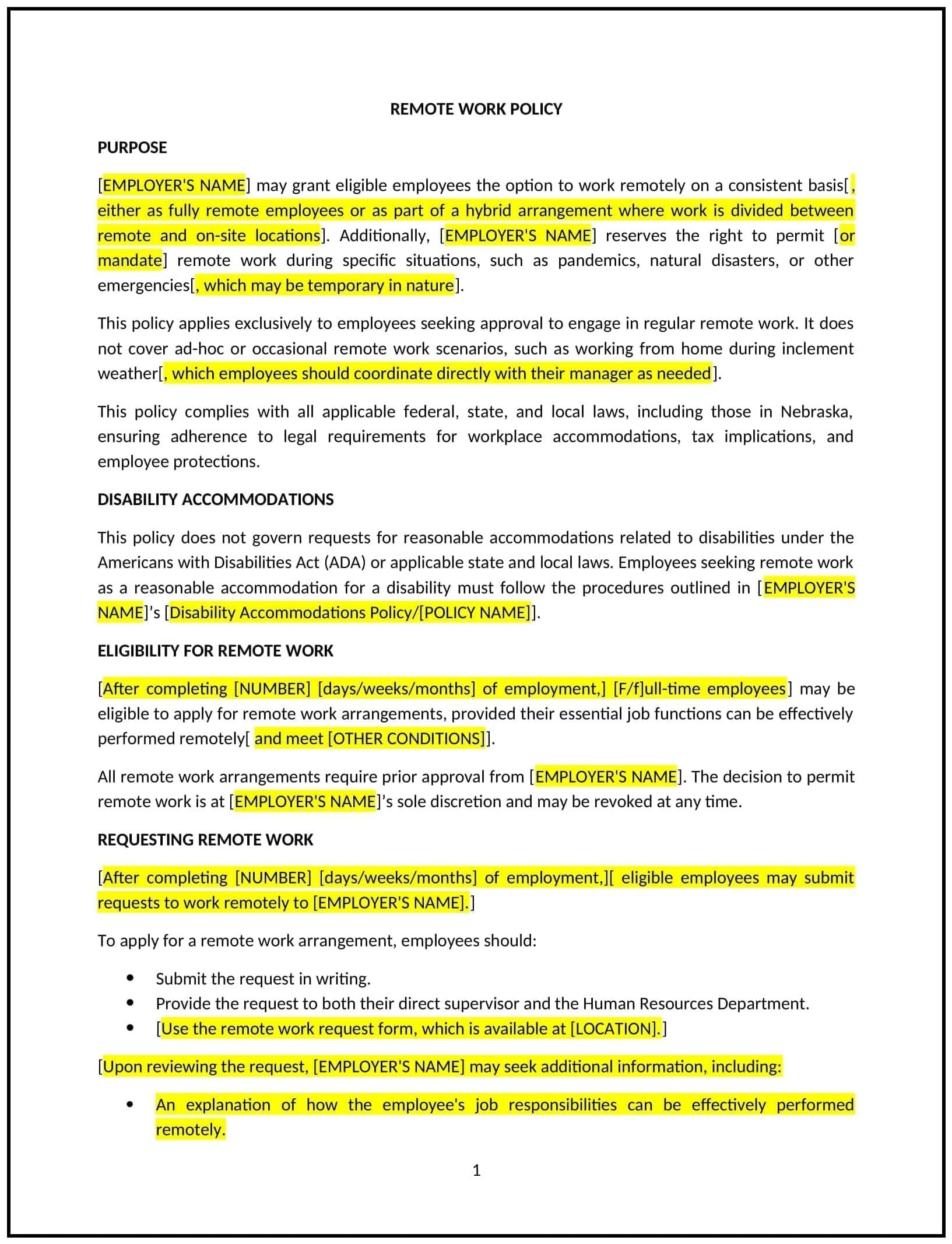Remote work policy (Nebraska): Free template: Free template
Got contracts to review? While you're here for policies, let Cobrief make contract review effortless—start your free review now.

Customize this template for free
Remote work policy (Nebraska)
A remote work policy helps Nebraska businesses establish guidelines for employees who work outside the traditional office environment. This policy is designed to provide clarity on expectations, responsibilities, and procedures for remote work arrangements. By formalizing remote work practices, businesses can support flexibility, productivity, and work-life balance while maintaining operational efficiency.
By implementing this policy, businesses in Nebraska can attract and retain talent, reduce overhead costs, and adapt to evolving work trends.
How to use this remote work policy (Nebraska)
- Define remote work eligibility: Specify which roles or employees are eligible for remote work based on job responsibilities and performance.
- Set work hours and availability: Outline expectations for work hours, availability, and communication during remote work.
- Establish equipment and technology requirements: Provide guidelines on the tools, software, and equipment employees need to work remotely.
- Address data security: Explain how employees should handle sensitive information and maintain data security while working remotely.
- Outline performance expectations: Define how employee performance will be evaluated and monitored in a remote work environment.
- Provide reimbursement guidelines: Specify whether and how businesses will reimburse remote work-related expenses, such as internet or office supplies.
- Communicate the policy: Share the policy with employees during onboarding and through internal communications to ensure awareness and understanding.
- Train managers: Educate supervisors on how to manage remote teams effectively and maintain productivity.
- Review and update the policy: Periodically assess the policy’s effectiveness and make adjustments as needed to reflect changes in business needs or employee feedback.
Benefits of using this remote work policy (Nebraska)
This policy offers several advantages for Nebraska businesses:
- Supports flexibility: Remote work options help employees balance work and personal responsibilities, improving job satisfaction.
- Reduces overhead costs: Allowing remote work can lower expenses related to office space, utilities, and supplies.
- Expands talent pool: Remote work policies enable businesses to hire talent from across Nebraska or beyond, regardless of location.
- Enhances productivity: Many employees report higher productivity when working remotely due to fewer distractions and flexible schedules.
- Aligns with Nebraska values: The policy reflects the state’s emphasis on work-life balance, community, and adaptability.
- Improves retention: Offering remote work options can increase employee loyalty and reduce turnover.
- Supports business continuity: Remote work policies ensure operations can continue during disruptions, such as extreme weather or health crises.
Tips for using this remote work policy (Nebraska)
- Communicate the policy effectively: Share the policy with employees during onboarding and through regular reminders, such as emails or training sessions.
- Provide training: Educate employees and managers on remote work best practices, including communication tools and time management.
- Set clear expectations: Define work hours, availability, and performance metrics to ensure accountability and productivity.
- Invest in technology: Provide employees with the necessary tools, such as laptops, software, and secure access to company systems.
- Monitor performance: Use key performance indicators (KPIs) to evaluate remote employees’ productivity and address any issues promptly.
- Encourage communication: Foster regular check-ins and team meetings to maintain collaboration and engagement.
- Review the policy periodically: Update the policy as needed to reflect changes in business needs, employee feedback, or industry trends.